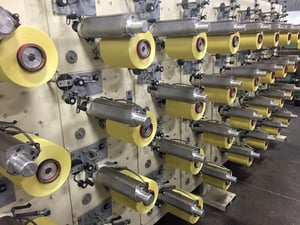 Anyone who works with industrial fabrics knows DuPont™ Kevlar® has a reputation for being one of the world’s toughest fabrics. However, it’s sometimes criticized for being impossible to dye. This isn’t completely true.
Anyone who works with industrial fabrics knows DuPont™ Kevlar® has a reputation for being one of the world’s toughest fabrics. However, it’s sometimes criticized for being impossible to dye. This isn’t completely true.
As you may know, Service Thread offers Kevlar® as well as many other types of industrial threads and yarns, and we are devoted to providing education on related topics. So let’s take a closer look at Kevlar® and whether it can be dyed.
What is Kevlar®?
Invented by scientist Stephanie Kwolek at DuPont™, Kevlar® is a strong, durable, heat-resistant para-aramid synthetic fiber that is perhaps best known for its use in ballistic body armor. Due to its strength, it’s known as the fiber that’s stronger than steel - and in fact, tests show it is actually 10 times stronger than steel on an equal-weight basis.
Here’s a quick look at the characteristics of Kevlar®:
- Inherently flame-resistant
- Heat resistant
- High strength
- High tensile strength-to-weight ratio
- High ballistic resistance
- Slash, cut, and puncture-resistant
- Lightweight and flexible
- Durable
- Can be reclaimed and repurposed
- Generally meets government and personal protective equipment (PPE) standards
- Not a skin irritant and non-respirable, even in shed fibers
Its high strength comes from its molecular inter-chain bonds and its ballistic resistance properties are further increased when it is woven into a fabric. Because Kevlar® fibers are so tightly spun that it is nearly impossible to separate them, a fabric made from Kevlar® fibers is extraordinarily force-resistant and can easily absorb and dissipate energy.
Many industrial fiber and fabric processors choose Kevlar® due to its inherent heat and flame resistance. It’s thermally resistant and does not start decomposing until it reaches 800 degrees Fahrenheit, will not combust until the temperature exceeds that temperature, and it will not melt or drip.
Is Kevlar® Hard to Dye?
Kevlar® is sometimes thought of as being impossible to dye, but that’s not exactly accurate as Spun Kevlar® can be dyed, it is multifilament Kevlar® that cannot be dyed. If you want to be 100% sure that your Kevlar® is dye-able, and tensile properties are not critical, be sure to use the spun type.
There are some colored Kevlar fibers available but the product range is limited and they are not as common. These fibers are pigmented during extrusion much like a solution-dyed polyester or nylon. Any additional color added as a secondary process is mostly what we are referring to when we mention tinting and dyeing.
Multifilament Kevlar® in its natural, yellow color can only be tinted, not dyed. In practice, tinting can be quite a messy process and the color may not remain in place permanently without an after-treatment that ensures colorfastness. Even with an after-treatment, tinted Kevlar® may fade due to weather and wear.
As an alternative to the hassle of tinting, another option for color in multifilament Kevlar® is the use of colored tracers. Tracers are long, thin, colored fibers that are twisted right into the yarn bundle. These tracers are used for identification purposes in things like Kevlar® ripcords for fiber optic cables, where pulling the wrong cord would be a big problem.
Many state departments of transportation use standard color codes to keep track of fiber optic cables and components. These standards may be phrased as something like “black with white tracer” or “black with yellow tracer” to identify each individual cable.
Final Thoughts About Dyed Kevlar®
As you can see, Kevlar® is difficult but not impossible to dye and can be used with color in a variety of applications. If you are using a spun type then chemically dyeing is possible, otherwise you can opt to tint the material or use colored tracers.
Service Thread does not offer Kevlar® dyeing or tinting services but can provide spun and colored Kevlar® direct from the manufacturer for use in your industrial processing. We invite you to read more about Kevlar® from Service Thread or contact us for assistance.



